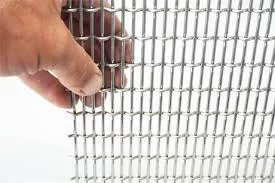-
+86 15030157877
-
sales@galvanizedmetalmesh.com
พ.ย. . 08, 2024 00:19 Back to list
Wholesale Field Fencing Solutions for Farms and Agricultural Projects
Understanding Wholesale Field Fencing An Essential Guide for Farmers and Ranchers
When it comes to the agricultural and livestock industry, the importance of effective fencing cannot be overstated. One of the most reliable and durable options available on the market today is wholesale field fencing. This type of fencing not only provides security and containment for livestock but also offers versatility and longevity that can withstand the test of time. In this article, we will explore the benefits, types, and considerations of wholesale field fencing, helping farmers and ranchers make informed decisions for their operations.
What is Field Fencing?
Field fencing, commonly referred to as agricultural or livestock fencing, is designed specifically to enclose areas such as pastures, fields, and larger agricultural spaces. Typically made from high-tensile steel wire, this fencing is constructed to deter livestock from escaping and to protect crops from wildlife. Wholesale field fencing is sold in bulk quantities, making it a cost-effective solution for large-scale agricultural operations.
Benefits of Wholesale Field Fencing
1. Cost-Effectiveness Purchasing field fencing at wholesale prices allows farmers and ranchers to save significantly on their fencing budgets. This is particularly important for those managing large tracts of land, where the cost can quickly add up.
2. Durability Field fencing is made from materials that are meant to endure various weather conditions and resist rust and corrosion. High-tensile steel wire is often used, providing strength and flexibility, which helps maintain the fence's integrity over time.
3. Low Maintenance Once installed, wholesale field fencing requires minimal maintenance compared to other fencing options. This is a crucial benefit for busy farmers who may not have the time or resources to spend on frequent repairs.
4. Versatility Available in various designs and configurations, wholesale field fencing can accommodate different types of livestock, including cattle, sheep, and horses. The flexibility in design means that farmers can choose a type that suits their specific needs.
5. Easy Installation Most field fencing is designed for ease of installation, often coming with pre-cut lengths and easy-to-follow instructions, which helps reduce labor costs significantly.
Types of Field Fencing
There are several types of field fencing available on the market, each with distinct features suited for different applications. Some of the most common types include
wholesale field fence

1. Barbed Wire Fencing This option features sharp barbs spaced along the strands of wire, making it effective for deterring intruders and containing larger livestock.
2. Woven Wire Fencing Consisting of horizontal and vertical wires woven together, this type of fencing is ideal for containing smaller livestock such as sheep and goats.
3. Electric Fencing Incorporating an electric current, this option provides an effective deterrent without the need for physical barriers. It is often used in conjunction with other types of fencing for maximum effectiveness.
4. Stock Fencing This is a type of woven wire fencing specifically designed to contain livestock while preventing smaller animals from passing through.
Considerations When Purchasing Wholesale Field Fencing
When looking to buy wholesale field fencing, it's important for farmers and ranchers to consider several factors
1. Type of Livestock Different animals require different fencing specifications. Understanding the behaviors and needs of the livestock is crucial in selecting the appropriate fencing type.
2. Terrain The type of land can influence fence installation and effectiveness. Hilly or uneven terrain may require different fencing techniques compared to flat land.
3. Local Regulations It's important to check local zoning laws and regulations regarding fencing to ensure compliance and avoid potential fines or conflicts with neighbors.
4. Long-Term Needs Consider how your fencing needs might change over time. Opting for higher-quality materials might incur higher upfront costs but lead to significant savings over the fence’s lifespan.
Conclusion
Wholesale field fencing is a vital investment for any farmer or rancher looking to secure their livestock and protect their crops. With its cost-effectiveness, durability, and low maintenance, it is a practical choice that can accommodate various agricultural needs. By understanding the different types of field fencing and considering factors such as livestock type and terrain, agricultural producers can make informed decisions that will ultimately enhance the efficiency and productivity of their operations. As the agricultural landscape continues to evolve, investing in quality fencing solutions remains indispensable for success in the industry.
-
Stainless Steel Wire Mesh Roll Wholesale & Manufacturers – Quality Exporters
NewsJul.26,2025
-
High Quality 3D Curved Welded Wire Mesh Fence for Security and Aesthetics
NewsJul.25,2025
-
High-Quality Security Window Screen Mesh for Home & Office Protection
NewsJul.24,2025
-
Hexagonal Gabion for River Bank Protection and Retaining Walls
NewsJul.23,2025
-
High Quality Stainless Steel Wire Mesh Roll & Supplier Wholesale Price
NewsJul.22,2025
-
Hexagonal Gabion Mesh: Durable Stone Cages for Landscaping
NewsJul.22,2025



